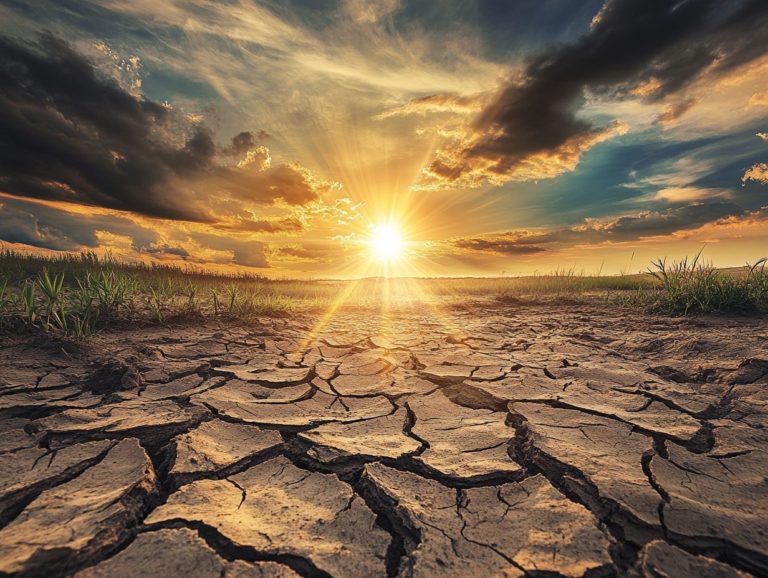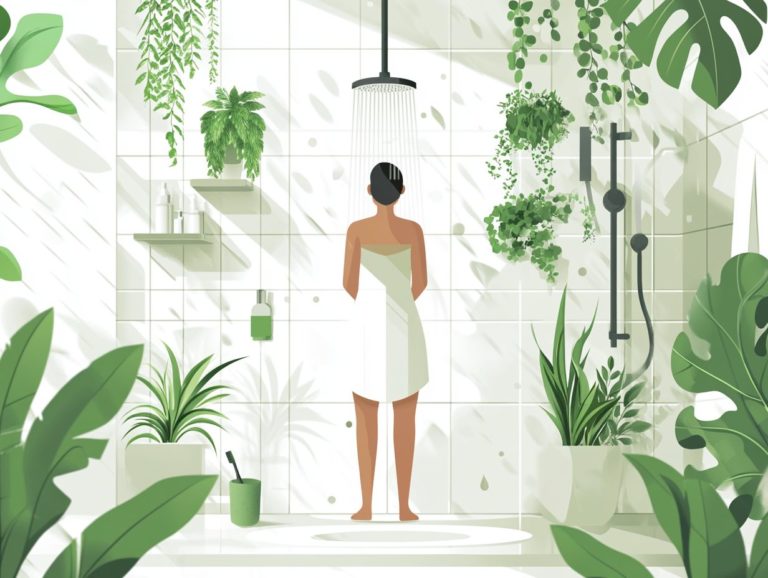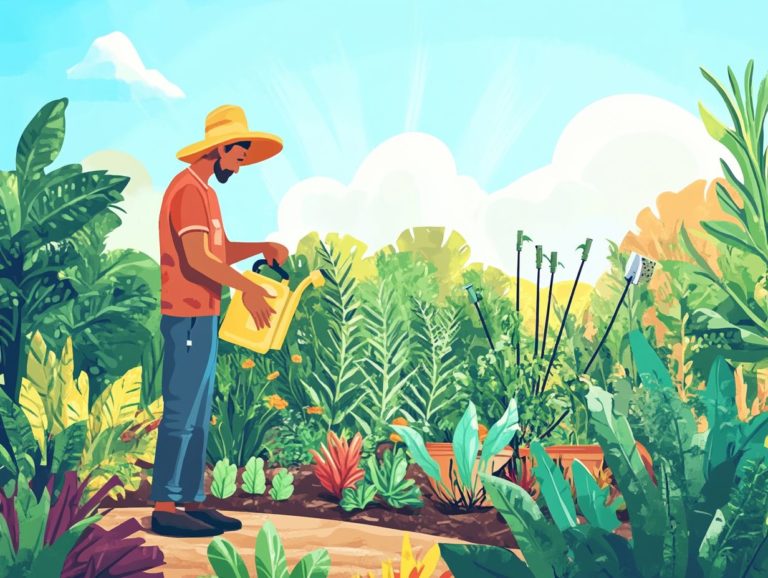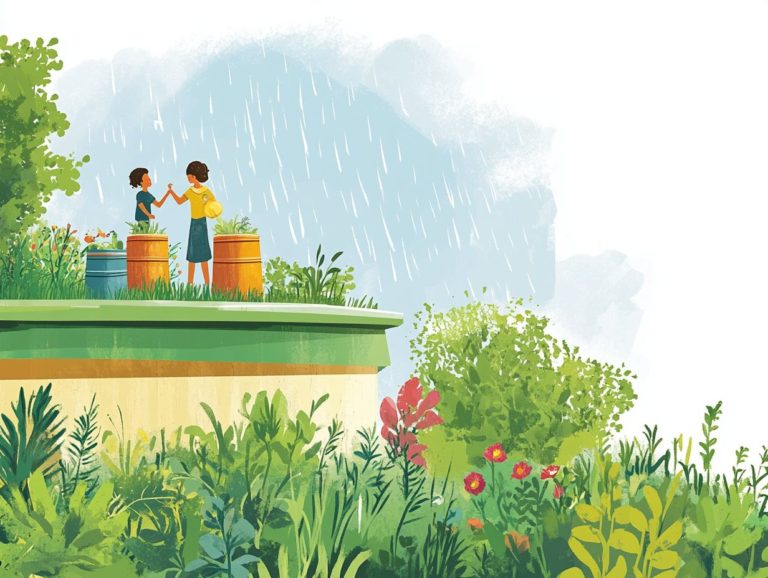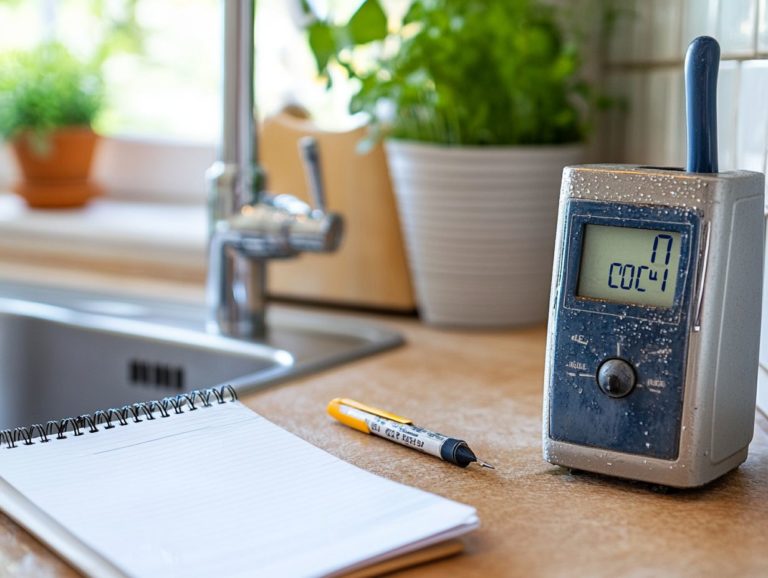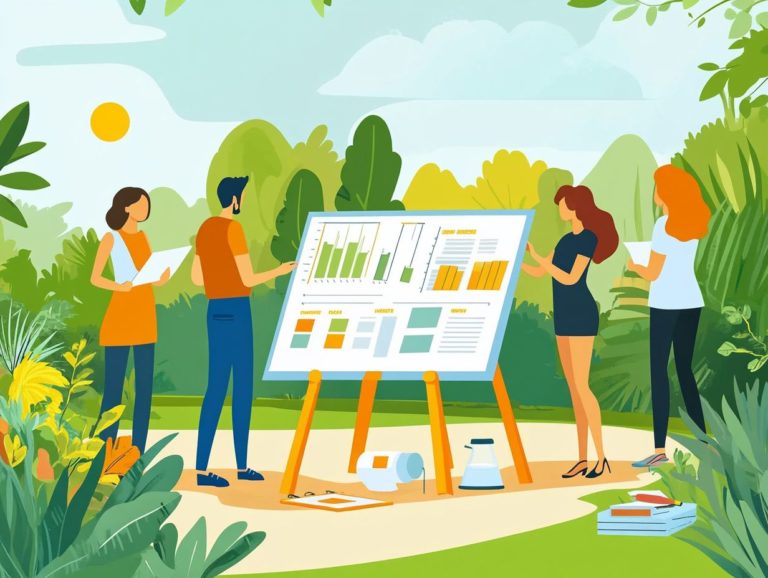10 Effective Water Conservation Tips for Homeowners
Water is an invaluable resource, yet it s easy to overlook its abundance in our daily lives.
With growing concerns about drought and water scarcity, embracing water-saving habits at home becomes essential.
This article highlights the benefits of conserving water not just for the environment, but also for your finances.
Dive in now to discover easy ways to save water and money!
Contents
- Key Takeaways:
- 1. Fix Leaks and Drips
- 2. Install Water-Efficient Fixtures
- 3. Use a Rain Barrel to Collect Water
- 4. Water Your Lawn and Garden Wisely
- 5. Consider Drought-Resistant Landscaping
- 6. Shorten Your Showers
- 7. Only Run Full Loads in the Dishwasher and Washing Machine
- 8. Use a Pool Cover
- 9. Don’t Let the Faucet Run While Brushing Your Teeth
- 10. Only Use the Garbage Disposal When Necessary
- What Are the Benefits of Conserving Water?
- Frequently Asked Questions
- What are some simple ways to conserve water at home?
- How can I reduce my water usage when doing laundry?
- What is the most effective way to conserve water in the bathroom?
- Fixing leaks is crucial for saving water!
- How can I conserve water in my yard and garden?
- What are some long-term solutions for conserving water at home?
Key Takeaways:
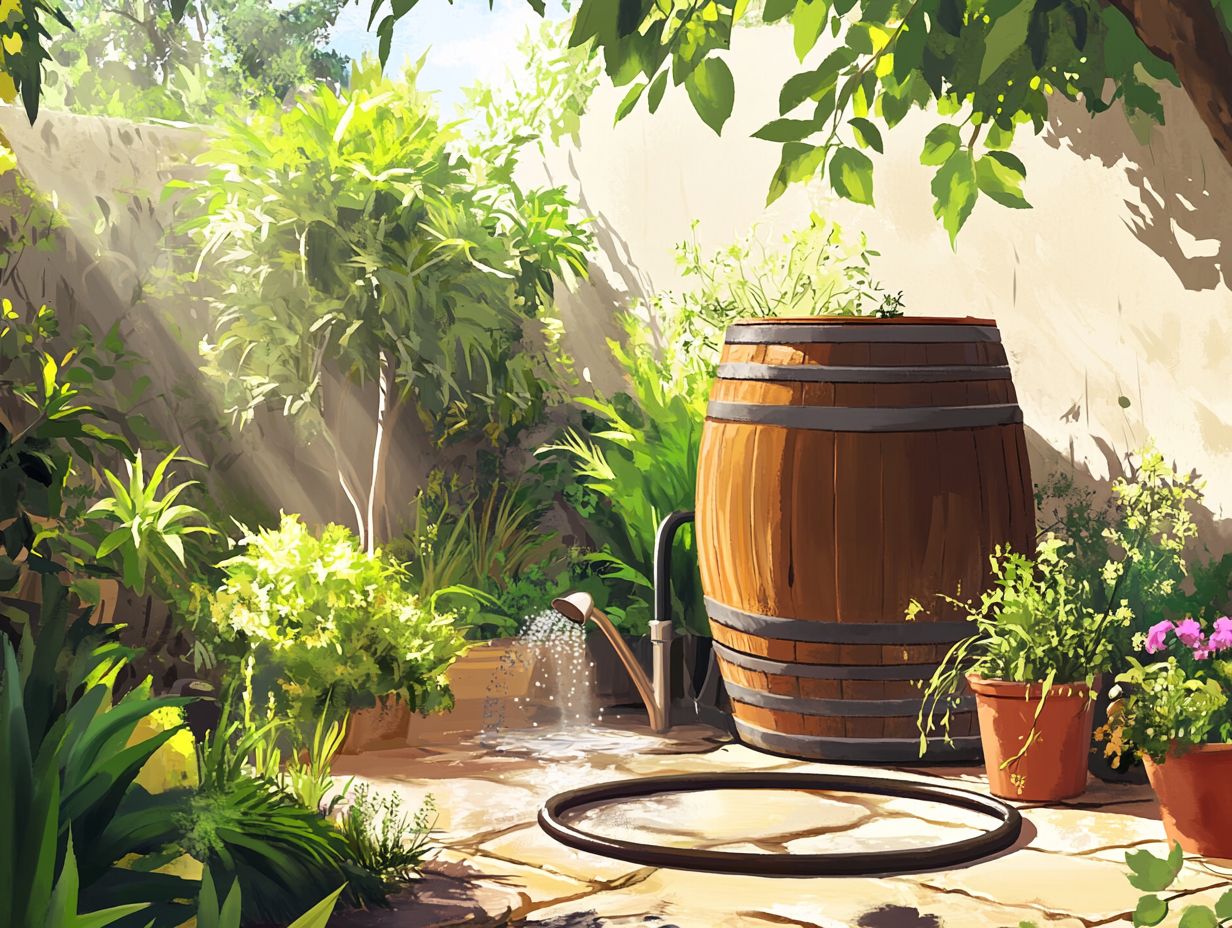
- Fix leaks to save hundreds of gallons annually.
- Install water-efficient fixtures to reduce usage by up to 60%.
- Collect rainwater for gardening.
1. Fix Leaks and Drips
Fixing leaks and drips is an essential step in your journey toward water conservation. Not only does it help reduce your water usage, but it also plays a crucial role in managing your household consumption more efficiently. For more effective strategies, consider these water-saving tips for apartment dwellers.
Fixing these issues promptly lowers your water bills and supports sustainable practices. A small leak can waste gallons of water daily, adding to water scarcity, particularly in regions where resources are limited.
Common sources of leaks in your home include faucets, toilets, pipes, and irrigation systems each of which can typically be repaired with relative ease.
- A dripping faucet can waste over 3,000 gallons a year, while a running toilet can squander nearly 200 gallons daily.
By repairing these leaks, you not only preserve vital water resources but also enjoy substantial cost savings potentially hundreds of dollars each year on your utility bills.
According to the U.S. Environmental Protection Agency, the average household can save more than 10,000 gallons of water annually simply by fixing leaks. This effort not only benefits you financially but also contributes to broader water conservation initiatives, including the use of must-have water conservation tools for homeowners, that support environmental sustainability.
2. Install Water-Efficient Fixtures
Installing water-efficient fixtures is a savvy way to conserve water and trim down those household utility bills. Modern innovations like low-flow showerheads, faucets, and toilets are expertly designed to reduce water usage without compromising performance.
Consider incorporating options like dual-flush toilets, which let you choose between a full or reduced flush. This small adjustment can lead to significant reductions in bathroom water usage.
Energy-efficient dishwashers and washing machines, often equipped with cutting-edge technology, also lower both water and energy consumption. Upgrade today to start saving tomorrow!
By adopting such fixtures, you re not just benefiting the environment; you re also enhancing your property value, creating a win-win situation for anyone committed to making sustainable choices.
3. Use a Rain Barrel to Collect Water
Using a rain barrel for rainwater harvesting is a brilliant way to conserve water and harness the natural resources around you. By collecting rainwater from your roof and gutters, you can pave the way for a more sustainable future while reducing your dependence on municipal water supplies.
This practice not only alleviates water scarcity but also nurtures local ecosystems by minimizing runoff and pollution entering waterways.
Imagine this: your average roof can gather enough rain to fill a 55-gallon barrel with just a quarter-inch of rainfall. Over a single rain season, you could collect an impressive 1,000 gallons!
To ensure you get the most out of your setup, place the barrel directly beneath a downspout and make sure it s tightly sealed to keep those pesky mosquitoes at bay. Regular upkeep is key cleaning the screen and checking for any debris will keep your system running smoothly.
If you really want to amp up your water conservation game, consider integrating your rainwater system with greywater recycling (used water from sinks, showers, and washing machines). This combination can significantly enhance your water-saving efforts, especially in areas prone to drought.
4. Water Your Lawn and Garden Wisely
Watering your lawn and garden wisely is crucial for effective water conservation. You can make simple changes to save water at home, which can significantly lower your household water usage.
Employ efficient irrigation techniques like drip irrigation and soil moisture sensors. This ensures your plants receive the perfect amount of water, eliminating waste. Incorporate drought-resistant plants into your landscaping to enhance sustainable water management and preserve precious water resources for future generations.
These sensors provide real-time insights into soil moisture levels. Know when your garden needs water to avoid overwatering.
Opt for native and drought-tolerant plants. This reduces your water demand while cultivating a resilient garden that thrives with minimal effort.
Embrace water-saving habits, such as mulching to retain moisture and watering during early morning or late evening to curb evaporation. These practices can significantly bolster your environmental stewardship while keeping your garden lush and vibrant.
5. Consider Drought-Resistant Landscaping
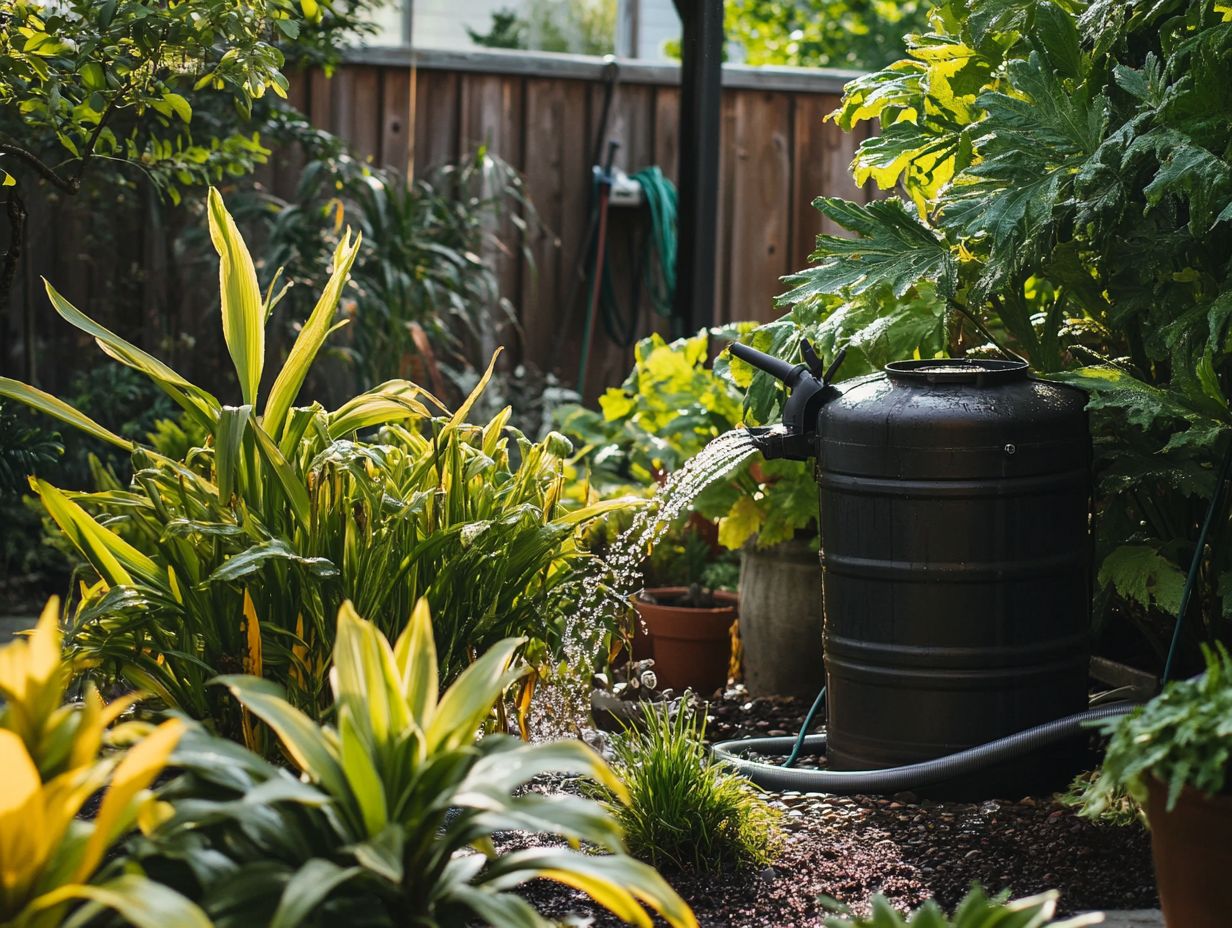
Consider drought-resistant landscaping, a method that reduces water use by choosing drought-resistant plants. This approach can elevate your water conservation efforts while creating a stunning and functional outdoor space.
By selecting native and drought-resistant plants, you drastically lessen your reliance on irrigation systems. This eco-friendly approach benefits the environment by preserving water and fosters a sustainable future for local ecosystems amid climate change and urbanization challenges.
Incorporate design elements like mulch beds, rock gardens, and thoughtfully placed hardscapes to promote efficient drainage and retain soil moisture.
Choose resilient plants such as succulents, ornamental grasses, and perennials suited to arid conditions. These plants ensure your vibrant landscape flourishes even during dry spells.
Communities worldwide have embraced successful drought-resistant landscaping, showcasing remarkable transformations. Think of the desert gardens in Phoenix and the drought-resistant parks in California, which exemplify these principles’ effectiveness.
This approach not only conserves water but also nurtures biodiversity, providing vital habitat for pollinators and other beneficial wildlife.
6. Shorten Your Showers
Want to make a big difference? Shorten your showers! This straightforward change can significantly reduce your household’s overall water usage.
By capping your shower time to just a few minutes, you can save gallons of water daily and cut down on the energy needed to heat that water.
This minor adjustment can lead to noticeable savings on utility bills and foster a greater awareness of water use within your community.
The average shower consumes between 2.1 and 5.8 gallons of water per minute. A 10-minute shower can use up to 58 gallons! Cutting back on this time benefits the environment and promotes a culture of sustainability.
To help establish new habits, set a timer or use a waterproof clock in the bathroom to monitor your duration. Investing in energy-efficient showerheads can enhance your water savings without compromising comfort.
Start today to save water and cut your bills! By adopting these practical changes, you can enjoy the dual benefits of lower water bills and a reduced carbon footprint, making a meaningful contribution to a more sustainable household.
7. Only Run Full Loads in the Dishwasher and Washing Machine
Running only full loads in your dishwasher and washing machine is a vital conservation practice. It can significantly cut down on water usage and lower your household water bills.
Both appliances are engineered to use a specific amount of water per cycle. Maximizing their efficiency by operating them only when they’re full allows for effective water management.
Typically, a dishwasher consumes about 6 gallons of water per load. A standard washing machine can use anywhere from 20 to 40 gallons.
By strategically planning your laundry days and grouping similar items together, you can ensure that you’re maximizing each wash. Likewise, dishwashing should only be done when there s a full load.
This approach not only conserves water but also saves energy and money. Utilizing these water-saving appliances effectively contributes to environmental sustainability while leading to tangible savings on your monthly utility bills.
8. Use a Pool Cover
Using a pool cover can significantly elevate your water conservation efforts. It reduces evaporation and minimizes the need for constant refills.
This addition helps maintain your pool’s water level. It also lowers your utility bills by reducing heating costs.
Embracing this practice is a meaningful step toward sustainable water management, whether at home or within your community, and you can start by learning about common water conservation tips.
Statistics reveal that a pool cover can reduce evaporation by up to 90%. This translates into thousands of gallons saved each year.
By opting for this practical solution, you safeguard your investment. You also take a proactive role in conserving essential water resources.
Covering your pool can decrease the amount of chemicals needed for maintenance, leading to even more cost savings.
With these advantages in mind, it’s obvious that a pool cover is not just an accessory; it’s a smart, eco-friendly choice that benefits both your finances and the health of our environment.
9. Don’t Let the Faucet Run While Brushing Your Teeth
Not letting the faucet run while you brush your teeth might seem like a small gesture. However, it s a powerful water-saving habit that can make a significant difference in overall conservation efforts.
This simple practice helps reduce your water usage, saving gallons each day and highlighting the importance of mindful water use in your daily routine.
Consider this: the average faucet flows at about 2.2 gallons per minute. If you leave the water running while brushing for just two minutes, you could waste up to 4.4 gallons daily.
While that might seem insignificant on its own, think about the over 100 million people who brush their teeth daily in the U.S. The potential water wasted is nothing short of astonishing.
Every drop counts! By turning off the tap while lathering soap or promptly fixing leaks, you can make a real difference.
Each drop saved contributes to preserving this vital resource, showcasing the powerful impact that mindful actions can have in fostering a sustainable future.
10. Only Use the Garbage Disposal When Necessary
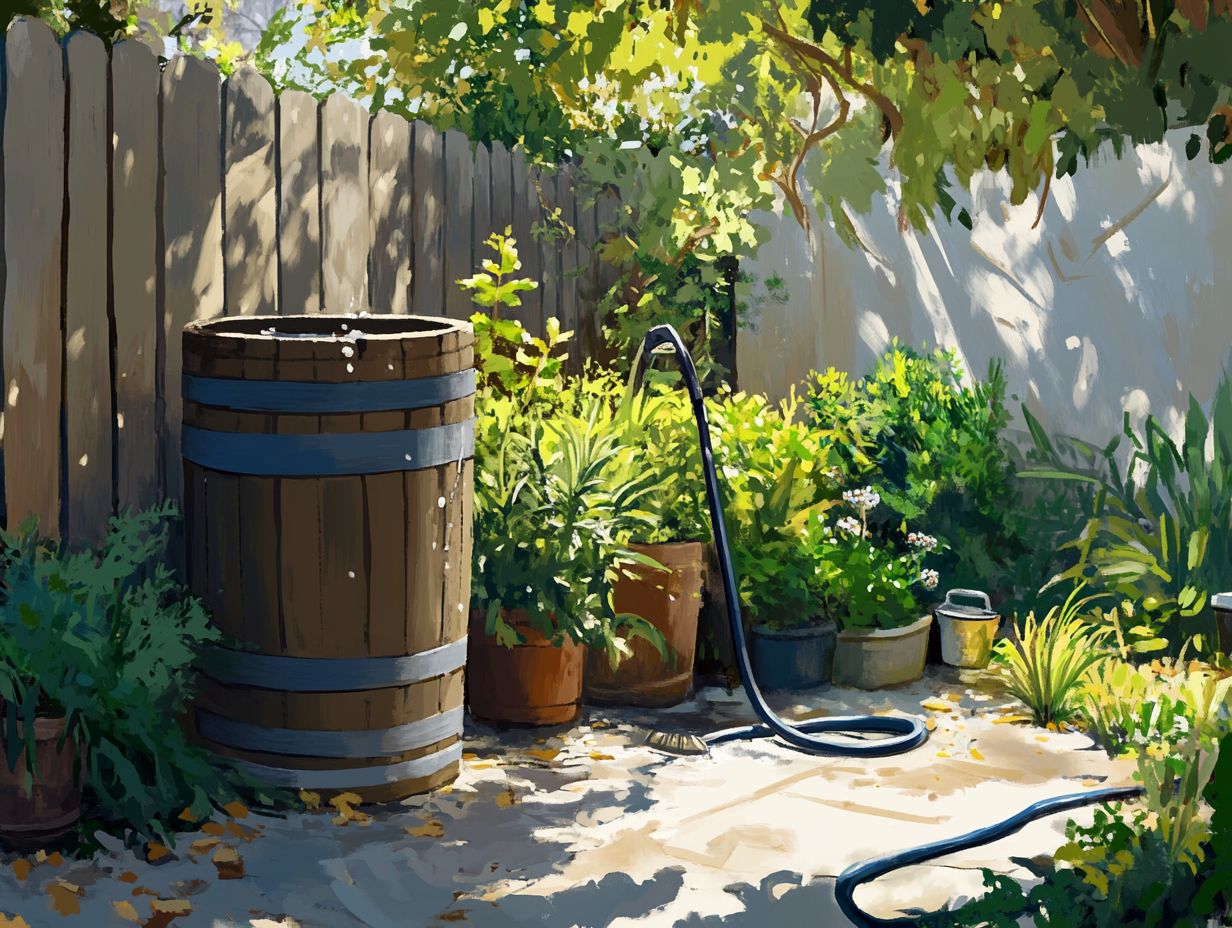
Using the garbage disposal only when necessary is an eco-friendly choice. It significantly helps conserve water and reduce your household consumption.
Each time you turn on the disposal, it requires water to function. This can inflate your water usage if used too often.
By considering alternative waste disposal methods and limiting your reliance on disposals, you can practice mindful water use and embrace sustainable habits in your kitchen.
One excellent alternative is composting. Composting is the process of turning food scraps into nutrient-rich soil.
This not only reduces the need for a disposal but also transforms food scraps into valuable organic material for your garden.
By diverting waste from landfills and cutting down on your dependence on water-intensive disposals, you can play a crucial role in water conservation.
Implementing composting practices fosters a more eco-friendly lifestyle, helping to shrink your carbon footprint. Ultimately, as you recognize the environmental benefits of reducing your reliance on disposals, you contribute to a broader movement toward sustainable living that aligns beautifully with modern eco-conscious values.
What Are the Benefits of Conserving Water?
Conserving water brings many benefits. These extend beyond individual households to influence water security and sustainable practices.
As the global population rises, the pressure on water resources increases. Effective water management is crucial for balancing nature.
Saving water can lower your utility bills. It also reduces costs for water treatment and infrastructure maintenance.
Your efforts to save water protect ecosystems and wildlife habitats. This nurtures healthier natural environments.
Building a culture of conservation strengthens community bonds. Residents can collaborate on initiatives and share resources.
Engaging community members in educational programs raises awareness. This creates a sense of shared responsibility for water resources.
How Can Water Conservation Help the Environment?
Water conservation is key to protecting the environment. It helps prevent pollution and safeguard ecosystems.
As climate change worsens, effective water conservation becomes even more important. It helps mitigate drought effects and preserves aquatic habitats.
Using less water supports aquatic ecosystems. This helps maintain essential river flows for fish and wildlife.
Practices like rainwater harvesting enrich the soil. They enhance biodiversity and crop resilience against extreme weather.
For example, using mulch in your garden conserves moisture and reduces runoff that carries pollutants into waterways.
These actions collectively create a thriving environment. They also strengthen climate resilience, benefiting both nature and humanity.
What Are the Financial Benefits of Water Conservation?
Water conservation offers significant financial benefits. Lower utility bills are one immediate perk of saving water.
These savings can be redirected toward eco-friendly improvements around your home.
Households that adopt efficient practices can reduce their water bills by 20% to 50%. To enhance water-saving efforts, consider using the top water conservation apps for homeowners. Many local governments offer incentives like tax breaks or rebates.
Programs promoting water-efficient appliances often reimburse part of your investment. This makes it easier to start conserving water.
By taking advantage of these benefits, you save money while helping the environment. It s a win-win scenario!
How Can a Homeowner Monitor Their Water Usage?
You can effectively monitor your water usage through new technologies and straightforward practices that enhance water management in your home. By utilizing water meters, tracking your monthly utility bills, and adopting water-saving habits, you ll gain valuable insights into your consumption patterns and easily identify areas for improvement.
This proactive approach not only conserves water but also gives you the power to make informed decisions about your daily activities.
Smart irrigation systems can save you time and water! These systems are equipped with sensors that optimize your outdoor water usage by adjusting based on actual weather conditions.
Rain barrels present another practical solution, allowing you to collect and reuse rainwater for your gardening and landscaping needs.
By utilizing apps that monitor your daily water consumption, you can access real-time data that helps you understand trends in your usage. Recognizing peak water usage times or pinpointing leaks becomes a breeze with these tools, encouraging careful water use and promoting sustainable practices that ultimately lead to significant cost savings.
What Are Some Common Myths About Water Conservation?
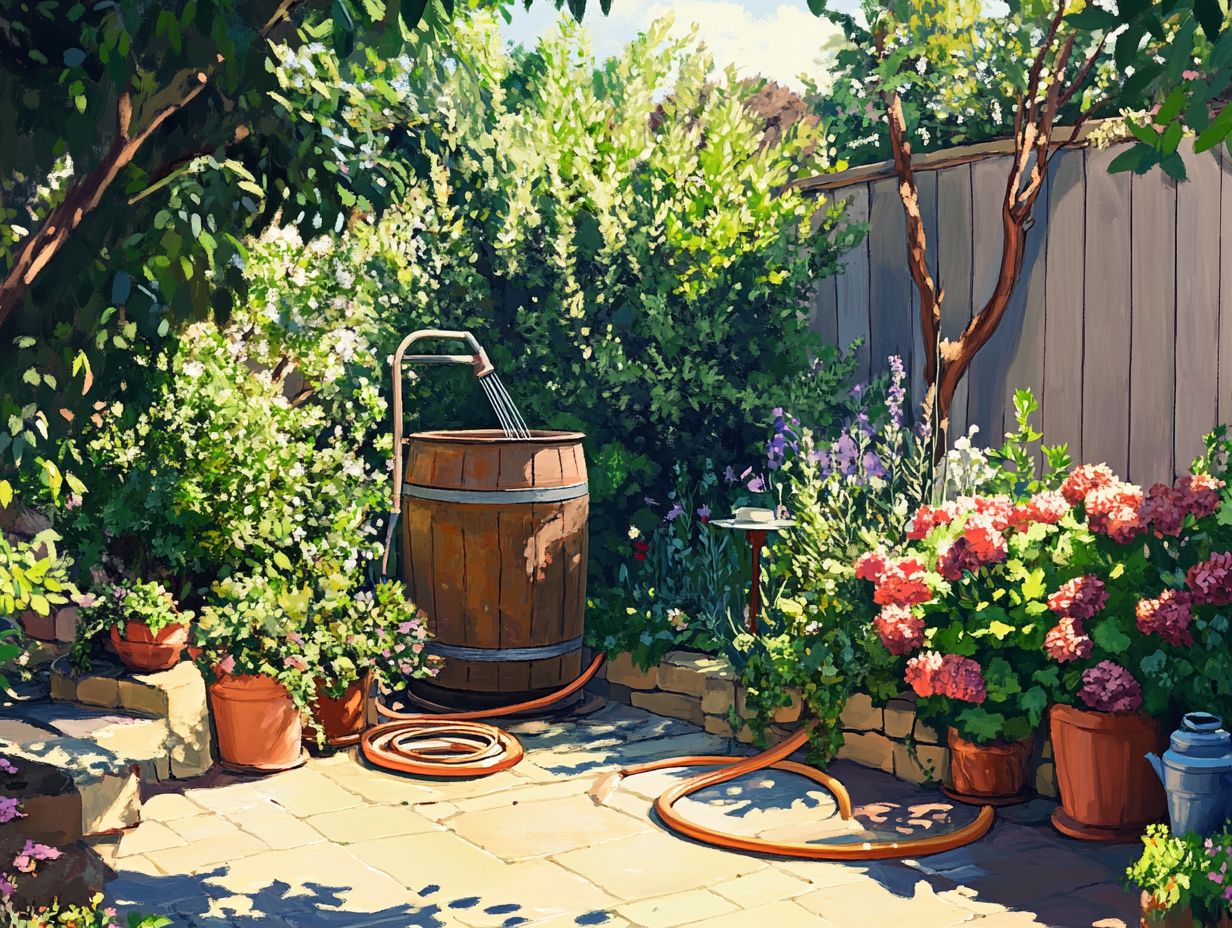
Numerous myths surround water conservation that can seriously undermine your efforts to adopt sustainable practices and safeguard vital water resources. Many individuals believe that conserving water is too difficult or that their personal contributions won t really matter, but that couldn t be further from the truth.
Debunking these misconceptions can inspire more people to adopt water-saving habits, ultimately contributing to pollution prevention and a sustainable future.
In reality, you play a crucial role in preserving our water supply. For instance, did you know that simply reducing your shower time by just two minutes can save over 1,000 gallons of water each year? According to the Environmental Protection Agency, taking straightforward actions like fixing leaks or turning off the tap while brushing your teeth can lead to significant impacts.
Research demonstrates that individual water conservation efforts can collectively result in substantial reductions in municipal water usage. This clearly shows that every drop counts!
By empowering yourself and others to recognize the effectiveness of their contributions, you can help inspire a cultural shift toward more responsible water management practices.
Frequently Asked Questions
What are some simple ways to conserve water at home?
Some simple ways to conserve water at home include fixing leaks, installing water-efficient fixtures, and using a broom instead of a hose to clean outdoor areas. For more tips, check out these essential water conservation resources for homeowners.
How can I reduce my water usage when doing laundry?
You can reduce your water usage when doing laundry by only washing full loads, using a high-efficiency washing machine, and reusing towels and clothing when possible.
What is the most effective way to conserve water in the bathroom?
The most effective way to conserve water in the bathroom is by installing a low-flow showerhead, turning off the faucet while brushing your teeth, and taking shorter showers.
Fixing leaks is crucial for saving water!
Yes, it is important to fix leaks in your home as they can waste a significant amount of water. Even a small leak can waste up to 20 gallons of water per day.
How can I conserve water in my yard and garden?
You can conserve water in your yard and garden by using drought-resistant plants, mulching to retain moisture, and watering only when necessary. Additionally, implementing tips for reducing energy consumption at home can further enhance your sustainability efforts.
What are some long-term solutions for conserving water at home?
Some long-term solutions for conserving water at home include installing a rainwater harvesting system, using greywater for irrigation, and planting native plants that require less water.

